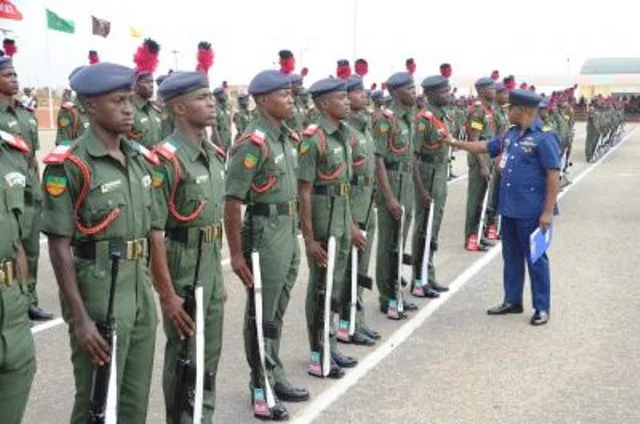Stepping into the Nigerian Defence Academy (NDA) interview room can feel like stepping onto a different battlefield—one where the armor is replaced with confidence, knowledge, and readiness. The journey towards joining the ranks of the nation’s defenders involves facing a barrage of questions designed to assess character, capability, and commitment.
In this guide, we’ll go through the 20 Frequently Asked Nigerian Defence Academy Interview Questions, preparing you to march confidently towards success.
Table of contents
- What you should know before going for the Nigerian Defence Academy Interview?
- What is the process of NDA screening?
- 20 Frequently Asked Nigerian Defence Academy Interview Questions
- Can you tell us about yourself and why you want to join the Nigerian Defence Academy?
- How do you handle pressure, and how would you cope with the demands of military training?
- What leadership qualities do you possess, and can you share an example of when you demonstrated them?
- How do you stay physically fit, and why is physical fitness important in the military?
- How do you plan to contribute to the values and ethos of the Nigerian Defence Academy?
- What sets you apart from other candidates, and why should we choose you for admission?
- How do you handle ethical dilemmas, and why is ethical conduct important in the military?
- How do you react to authority and follow orders?
- How do you handle stress and maintain mental resilience in challenging situations?
- How do you see yourself contributing to the broader goals of the Nigerian Armed Forces beyond your individual role?
- How do you handle situations that require quick decision-making and adaptability?
- Can you discuss a time when you worked effectively as part of a team to achieve a common goal?
- How do you ensure discipline and adherence to rules, both for yourself and within a team?
- How do you stay mentally focused during extended periods of duty or challenging missions?
- How do you handle feedback and criticism, and how does it contribute to your personal and professional growth?
- What do you believe is the greatest challenge facing the Nigerian Armed Forces today, and how would you contribute to addressing it?
- How do you handle conflicts within a team, and what steps would you take to resolve disagreements?
- Can you share an experience where you demonstrated resilience in the face of failure or setbacks?
- How do you keep yourself updated on global and national security issues, and why is this knowledge important for a military officer?
- If admitted to the NDA, what legacy would you like to leave behind during and after your training?
- Conclusion
- FAQs
- References
- Recommendations
What you should know before going for the Nigerian Defence Academy Interview?
Research the NDA:
Before the interview, delve into the history, mission, and values of the Nigerian Defence Academy. Familiarize yourself with its role in shaping future military leaders and understand the significance of the NDA in national defense.
Know the Military Lifestyle:
Being part of the armed forces involves a unique lifestyle. Research the daily routines, discipline expectations, and the physical and mental demands of military training. Understanding this lifestyle will show your commitment and readiness.
Physical Fitness Preparation:
Military training requires peak physical fitness. Ensure you are in good shape and practice physical exercises that mirror the demands of military training. Be ready to discuss your fitness routine and its importance.
Be Well-Informed About Current Affairs:
Stay updated on national and international news. You may be asked about your perspectives on current events. Being informed demonstrates your awareness of the world, a quality essential for military leaders.
Know Your Resume Thoroughly:
Your resume is a reflection of your achievements and experiences. Be ready to discuss every aspect of your resume, from your educational background to extracurricular activities. Relate these experiences to how they’ve shaped your character and leadership skills.
Understand Military Protocol:
Familiarize yourself with military etiquette and protocols. Knowing how to address officers, standing at attention, and other basic military courtesies will showcase your respect for the military institution.
Be Prepared for Ethical Questions:
Aspiring military officers must adhere to the highest ethical standards. Be ready to discuss ethical dilemmas and how you would navigate them. Demonstrating integrity is crucial for gaining the trust of your future colleagues.
Check out this related content: 30 Frequently Asked Cashier Interview Questions In Nigeria
What is the process of NDA screening?
The screening process for the Nigerian Defence Academy (NDA) involves several stages to assess the suitability of candidates for admission into the academy. While specific details may be subject to change, here is a general overview of the NDA screening process:
Application:
Prospective candidates submit online applications during the specified application period. The application includes personal details, educational qualifications, and other relevant information.
Screening Test:
Shortlisted candidates are invited to participate in a screening test. This test typically covers subjects like Mathematics, English, and General Knowledge. It serves as an initial assessment of candidates’ academic aptitude.
Medical Examination:
Successful candidates from the screening test undergo a thorough medical examination. This examination assesses the physical and mental fitness of candidates to ensure they can meet the demands of military training.
Interview:
Shortlisted candidates who pass the medical examination are invited for an interview. The interview evaluates candidates on various aspects, including their leadership potential, character, and motivation to join the armed forces.
Admission into NDA:
Candidates who successfully pass all stages of the screening process are offered admission into the Nigerian Defence Academy. This admission is contingent upon the successful completion of the subsequent stages of training.
Military Training:
Alongside academic training, candidates undergo rigorous military training to develop the physical and mental attributes required of military officers. This phase is crucial for shaping candidates into well-rounded officers.
Commissioning:
Upon successful completion of the training program, candidates are commissioned as officers in the Nigerian Armed Forces. They receive their commissions during a formal ceremony, marking the beginning of their service to the nation.
You should read: 20 Frequently Asked Account Officer Interview Questions
20 Frequently Asked Nigerian Defence Academy Interview Questions
Can you tell us about yourself and why you want to join the Nigerian Defence Academy?
My name is [Your Name], and I am motivated by a deep sense of patriotism. Joining the NDA is not just a career choice; it’s a commitment to serving and defending my nation. The NDA’s values of loyalty, courage, and integrity align with my personal principles, making it the ideal platform for me to contribute to national security.
How do you handle pressure, and how would you cope with the demands of military training?
I thrive under pressure by maintaining composure and focus. Military training demands resilience, discipline, and adaptability—qualities I have cultivated through my experiences. I approach challenges with a positive mindset, eager to learn and grow in the face of adversity.
What leadership qualities do you possess, and can you share an example of when you demonstrated them?
Leadership, to me, involves integrity, accountability, and leading by example. In a leadership role at [specific instance], I demonstrated effective communication, decision-making, and the ability to motivate my team to achieve a common goal.
You should read: 20 Frequently Asked Credit Officer Interview Questions
How do you stay physically fit, and why is physical fitness important in the military?
I prioritize physical fitness through regular exercise and a disciplined fitness routine. Physical fitness is crucial in the military for maintaining peak performance, endurance, and overall health. It ensures that soldiers can meet the demands of their roles and contribute effectively to the team.
How do you plan to contribute to the values and ethos of the Nigerian Defence Academy?
I am committed to upholding the core values of the NDA—loyalty, courage, and integrity. Through my actions, respect for colleagues, and dedication to continuous improvement, I aim to contribute positively to the esteemed ethos of the Nigerian Defence Academy.
What sets you apart from other candidates, and why should we choose you for admission?
My unique combination of [specific skills], along with my unwavering commitment to service and personal growth, sets me apart. I bring a strong sense of responsibility, adaptability, and a genuine passion for contributing to the defense of our nation.
Check out this related content: 30 Frequently Asked Interview Questions For Sales Representative
How do you handle ethical dilemmas, and why is ethical conduct important in the military?
Ethical conduct is paramount in the military, and I approach dilemmas with a commitment to uphold the highest standards. I carefully assess the situation, consider the implications of each decision, and choose the course of action that aligns with moral principles and military values.
How do you react to authority and follow orders?
I recognize the importance of following orders promptly and efficiently. Also, I understand that a disciplined chain of command is essential for the success of military operations. I approach authority with respect, humility, and a willingness to learn from experienced leaders.
How do you handle stress and maintain mental resilience in challenging situations?
I manage stress through effective time management, prioritization, and maintaining a positive mindset. In challenging situations, I focus on solutions, seek support when needed, and rely on my training and preparation to stay mentally resilient.
You should read: 20 Frequently Asked Questions for Waitress Interview
How do you see yourself contributing to the broader goals of the Nigerian Armed Forces beyond your individual role?
I see myself contributing to the broader goals of the Nigerian Armed Forces by actively engaging in team collaboration, sharing knowledge, and embracing opportunities for leadership. I aspire to be a positive influence on my peers, fostering a spirit of unity and dedication to the collective mission.
How do you handle situations that require quick decision-making and adaptability?
Quick decision-making and adaptability are vital in the military. I rely on a combination of training, situational awareness, and a calm mindset to make swift decisions. Flexibility and the ability to adapt to evolving circumstances are key attributes I bring to challenging situations.
Can you discuss a time when you worked effectively as part of a team to achieve a common goal?
In [specific instance], I collaborated with a diverse team to [describe the project/task]. Through effective communication, delegation of responsibilities, and a shared commitment to success, we achieved our goal. This experience reinforced my belief in the power of teamwork.
Check out this related content: 20 Frequently Asked Electrical Engineer Interview Questions
How do you ensure discipline and adherence to rules, both for yourself and within a team?
Discipline is the foundation of military life. I maintain personal discipline through adherence to routines and a strong sense of responsibility. Within a team, I lead by example, emphasizing the importance of rules and protocols for the collective success and safety of the group.
How do you stay mentally focused during extended periods of duty or challenging missions?
Mental focus is maintained through mindfulness, regular breaks, and staying connected to the mission’s purpose. I draw strength from the significance of the task at hand, break down large tasks into manageable parts, and stay motivated by the impact our efforts have on the larger goal.
How do you handle feedback and criticism, and how does it contribute to your personal and professional growth?
I view feedback as a valuable tool for growth. I actively seek constructive criticism, appreciate diverse perspectives, and use feedback as a catalyst for improvement. Embracing feedback is integral to continuous learning and enhancing my capabilities as an aspiring military officer.
Since you are reading this, you may also like: 20 Frequently Asked Seminary Admissions Interview Questions
What do you believe is the greatest challenge facing the Nigerian Armed Forces today, and how would you contribute to addressing it?
One significant challenge is [specific challenge]. I believe my [relevant skills or experience] can contribute to addressing this challenge. By collaborating with fellow officers, leveraging technological advancements, and promoting innovation, I aim to be part of solutions that strengthen the Nigerian Armed Forces.
How do you handle conflicts within a team, and what steps would you take to resolve disagreements?
Conflict resolution requires open communication and active listening. In resolving conflicts, I encourage dialogue, seek common ground, and mediate with the goal of finding mutually agreeable solutions. Maintaining a positive team dynamic is essential for mission success.
Can you share an experience where you demonstrated resilience in the face of failure or setbacks?
In [specific instance], I faced a setback but turned it into a learning opportunity. I reassessed the situation, identified areas for improvement, and implemented changes. Resilience, to me, is about bouncing back stronger from challenges and applying lessons learned to future endeavors.
Check out: 20 Frequently Asked Credit Officer Interview Questions
How do you keep yourself updated on global and national security issues, and why is this knowledge important for a military officer?
I stay informed through regular reading of reputable news sources, attending relevant seminars, and engaging with experts in the field. Being well-versed in security issues is crucial for making informed decisions, understanding the geopolitical landscape, and contributing effectively to national defense.
If admitted to the NDA, what legacy would you like to leave behind during and after your training?
If admitted, I aspire to leave a legacy of leadership, camaraderie, and positive influence. I aim to inspire my peers, contribute meaningfully to the training environment, and uphold the values of the NDA. Beyond training, I hope to contribute to the broader goals of the Nigerian Armed Forces with dedication and honor.
Since you are reading this, you may also like: 30 Frequently Asked Interview Questions For Sales Representative
Conclusion
As you prepare for the Nigerian Defence Academy interview, remember that each question is an opportunity to showcase not just your knowledge but also your character and commitment.
The journey ahead is one that requires both mental and physical fortitude. Answer with authenticity, stand tall, and march forward with the confidence that you are ready to embrace the responsibilities that come with defending our great nation.
FAQs
The NDA seeks qualities such as leadership potential, adaptability, critical thinking, physical fitness, and a strong commitment to serving the nation. Interviews aim to assess these attributes in candidates.
Prepare by understanding the NDA’s history, values, and the role of the military in Nigeria. Be ready to discuss your motivations for joining the academy, your awareness of national security issues, and demonstrate your physical fitness.
Anticipate questions about your personal background, leadership experiences, knowledge of current affairs, and your commitment to military service. Be prepared to discuss your problem-solving skills and ethical decision-making.
Physical fitness is essential for military service, and the NDA interview process includes assessments of candidates’ physical capabilities. Ensure you meet the fitness standards and be ready to demonstrate your endurance, strength, and overall fitness during the interview.
References
- jobzilla.ng– Nigerian defence academy interview questions
- 4ono.com– Nigerian defence academy interview questions
- onlinecourse360.com– Nigerian defence academy interview questions
- jump.africa– How to get into Nigerian defence academy- interview questions





